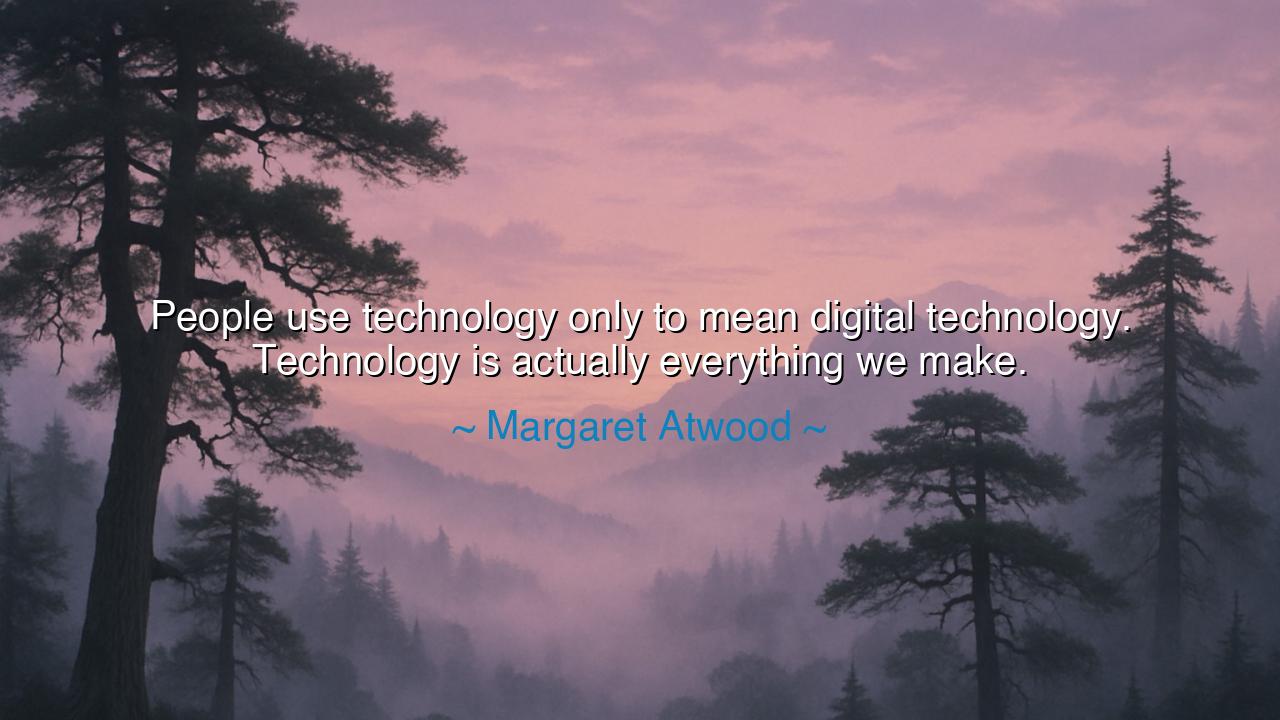
People use technology only to mean digital technology.
People use technology only to mean digital technology. Technology is actually everything we make.






In the voice of Margaret Atwood, a prophetess of letters and imagination, there came the reminder: “People use technology only to mean digital technology. Technology is actually everything we make.” These words strip away illusion and return us to first principles, for they proclaim that the essence of technology is not only in glowing screens or circuits of silicon, but in the simple, eternal act of creation itself. Every tool, every crafted object, every invention born from the human hand and mind is technology, and to forget this truth is to forget who we are.
For the ancients, technology was the shaping of stone into blades, the binding of reeds into boats, the weaving of cloth to protect the body. The bow, the plough, the wheel—these were all technologies, though no code was written, no signal transmitted. Atwood’s words remind us that to narrow technology to the digital alone is to deny the long river of human ingenuity. Technology is as old as humanity itself, beginning the moment we first turned thought into tool, necessity into creation.
Consider the tale of Archimedes, who, centuries before the first computer, harnessed levers, pulleys, and the principles of geometry to move ships and defend cities. His genius was technology, though wrought not from electricity but from the eternal laws of physics. Or remember the builders of the Great Pyramids, who, without machines, devised methods to raise stones heavier than armies could carry. Were these not technologies, just as marvelous as the satellites and microchips of our day? Atwood’s reminder rescues us from forgetfulness, teaching that the word “technology” should not be caged by the modern age.
Her wisdom also carries a warning: when people equate technology only with the digital, they become blind to the deep continuity of invention. They see smartphones but forget fire; they marvel at artificial intelligence but overlook the genius of irrigation, which once turned deserts into gardens. To forget the breadth of technology is to lose humility, for it tempts us to believe that our age alone is wise, when in truth we stand on the bones and brilliance of countless generations before us.
The meaning of the quote is therefore both expansive and humbling. Atwood teaches us that technology is the sum of human making, from the smallest needle to the largest network. It is not the child of computers, but the parent of civilization itself. It carries both glory and peril, for every technology—whether spear or algorithm—can be used for survival or for destruction. By broadening our vision, we remember that the responsibility of makers is timeless: not only to create, but to ask what their creation serves.
The lesson for us is clear: expand your understanding of technology beyond the digital. When you cook a meal, you are using technology. When you craft a chair, design a garden, or write with pen and paper, you are shaping the world with the same spirit of invention that built the modern machine. Do not despise small tools as “lesser,” nor worship digital tools as the only form of progress. Instead, honor all forms of making as part of humanity’s great tapestry.
So live with this wisdom: be mindful of what you create, for every act of making is an act of technology. Let your tools, whether simple or complex, serve not destruction but flourishing. Teach your children to see technology not only in their devices but in their hands, their homes, their communities. For in this vision lies humility, gratitude, and a deeper reverence for the long story of human ingenuity—a story that Atwood calls us to remember, and to continue writing with care.






AAdministratorAdministrator
Welcome, honored guests. Please leave a comment, we will respond soon